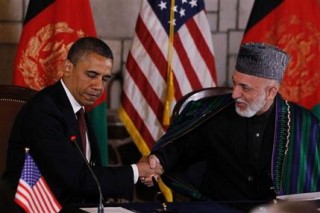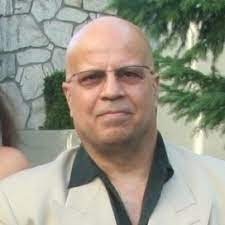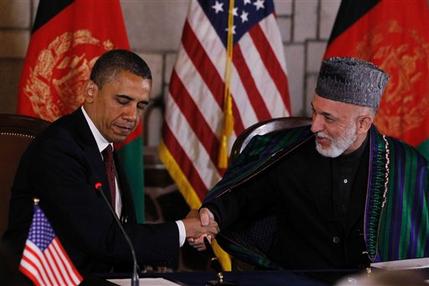By Khalil Nouri Staff Writer / Editor
The momentous encroachment in Afghanistan yesterday was not President Obama’s speech but the accord for ongoing co-operation between the United States and the Karzai government. In a briefing on the terms of the deal, the Obama administration outlined several components: Transitioning to an Afghan lead by 2014; training Afghan security forces so that they can provide for the security of Afghanistan, building an enduring partnership with Afghanistan, pursuing reconciliation within Afghanistan, and promoting regional stability.
All that said seem astonishingly glorifying for a country that evidently was brutalized by Pakistani backed Taliban.
But of course, all the above are farfetched if the security circumstances worsened with the departure of U.S. troops.

The international community and most Afghans are not blind. They can see U.S. is not fulfilling its stated goals and that, in fact, the chance of Afghanistan becoming a failed sate and haven for terrorists are increased by this game plan.
In fact, negotiating with the Taliban, who don’t show many signs for peace or to compromise anything.
And of course the proof of the partnership depends on how much U.S. force remains and how much they do. According to the administration, they’ll not be doing a whole a lot.
Does this resemble a brief description of Obama’s Afghanistan approach by using “Vietnamization” strategy that provided cover for the United States to exit from the Vietnam War? But it also paints the picture of “Who cares whether we win, just get us out of this hellhole.”
In regards to Pakistan, the country is not going to have a complete change in its strategic orientation, which means that Islamabad is not going to be comfortable with this agreement between Kabul and Washington, and therefore the security in Afghanistan may not be getting better as Pakistan’s proxies the Taliban and Haqqanis make solid thriving operations with impunity from their sanctuaries in Pakistan inside Afghanistan. Furthermore, the limited capacity of the Karzai government, remain the biggest risks to the process of turning security gains into a durable and sustainable Afghanistan.
On the other hand, endemic corruption in Afghanistan still is among the long-term and delicate challenges. In fact, the Karzai government’s corruption remains a major threat to the stability of Afghanistan. Setbacks in governance and development continue to slow the reinforcement of security gains. Such failures threaten the legitimacy and long-term vitality of the Afghan government.
Furthermore, recently Hamid Karzai threw the political timetable for the handover of security from NATO troops to Afghans into uncertainty, and he is considering an early Afghan presidential election in 2013. This means, the 5 year American style election term not only workable but in every step of the progress requires dependency on the presence of foreign troops.
And, lastly, the narrow political base of the Karzai regime, which was elected by a small minority of Afghans and reportedly with rigged votes, its ability to lead a credible counterinsurgency fight against the Taliban remains seriously in doubt.
So far, every day seems to widen the gap between the goals that the United States is seeking to achieve in Afghanistan and its ability to achieve them. For sure, there are hard and bumpy roads in the horizon not light as Mr. Obama claims.
Khalil Nouri is the cofounder of New World Strategies Coalition, a native think tank for nonmilitary solution studies for Afghanistan, and member of Afghanistan Study Group.

Khalil Nouri was born in an Afghan political family. His father, uncles, and cousins were all career diplomats in the Afghan government. His father was also amongst the very first in 1944 to open and work in the Afghan Embassy in Washington D.C., and subsequently his diplomatic career was in Moscow, Pakistan, London and Indonesia. Throughout all this time, since 1960’s, Khalil grew to be exposed in Afghan politics and foreign policy. During the past 35 years he has been closely following the dreadful situation in Afghanistan. His years of self- contemplation of complex Afghan political strife and also his recognized tribal roots gave him the upper edge to understand the exact symptoms of the grim situation in Afghanistan. In that regards, he sees himself being part of the solution for a stable and a prosperous Afghanistan, similar to the one he once knew. One of his major duties at the beginning of Operation Enduring Freedom in Afghanistan in 2002 was advisory role to LTG Franklin Hegenbeck. He has worked closely with the Afghan tribes and his tribal exposure is well tailored for unobstructed cross-cultural boundaries within all Afghan ethnicities. He takes pride in his family lineage specifically with the last name “Nouri” surnamed from his great-grandfather “Nour Mohammad Khan” uncle to King Nader-Shah and governor of Kandahar in 1830, who signed the British defeat and exit conformity leaving the last Afghan territory in second Anglo-Afghan war. Khalil is a guest columnist for Seattle Times, McClatchy News Tribune, Laguna Journal, Canada Free Press, Salem News, Opinion Maker and a staff writer for Veterans Today. He is the cofounder of NWSC Inc. (New World Strategies Coalition Inc.) a center for Integrative-Studies and a center for Integrative-Action that consists of 24- nonmilitary solution for Afghanistan. The function of the Integrative-Studies division (a native Afghan think tank) is to create ideas and then evolve them into concepts that can be turned over to the Integrative-Action division for implementation. Khalil has been a Boeing Engineer in Commercial Airplane Group since 1990, he moved to the United States in 1974. He has a Bachelor of Science degree in Mechanical Engineering, and currently enrolled in Masters of Science program in Diplomacy / Foreign Policy.
ATTENTION READERS
We See The World From All Sides and Want YOU To Be Fully InformedIn fact, intentional disinformation is a disgraceful scourge in media today. So to assuage any possible errant incorrect information posted herein, we strongly encourage you to seek corroboration from other non-VT sources before forming an educated opinion.
About VT - Policies & Disclosures - Comment Policy




